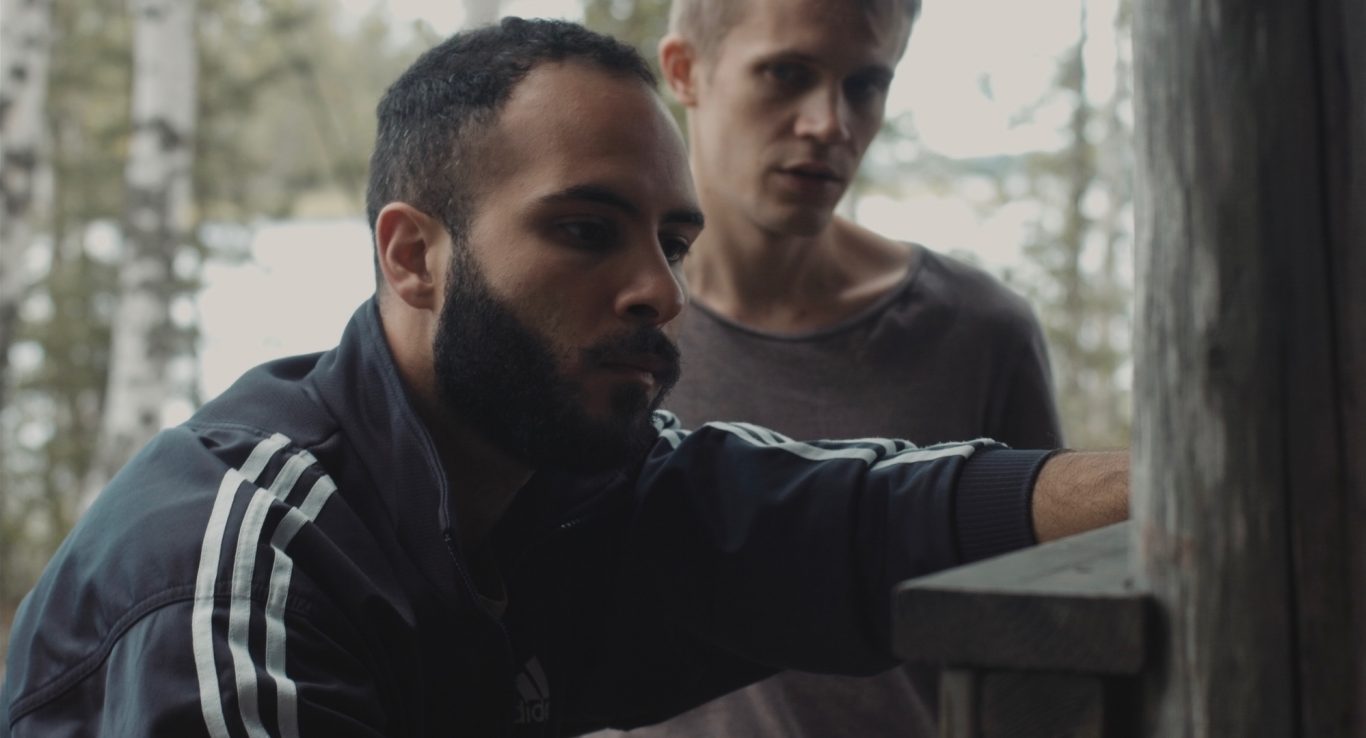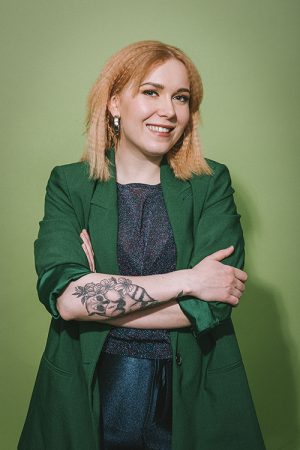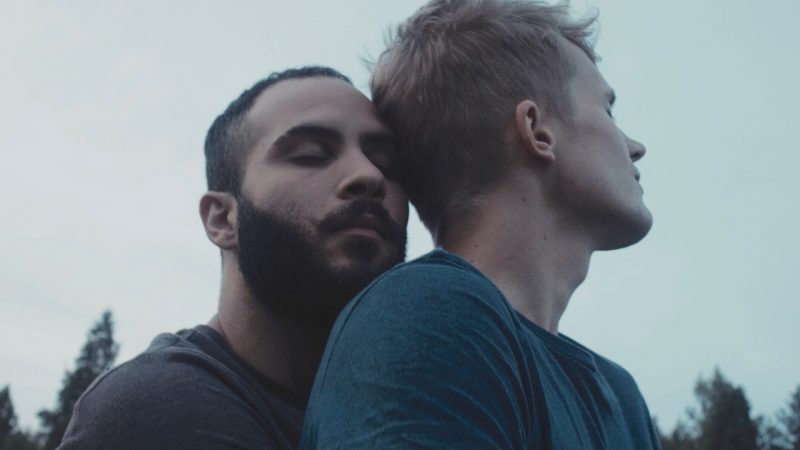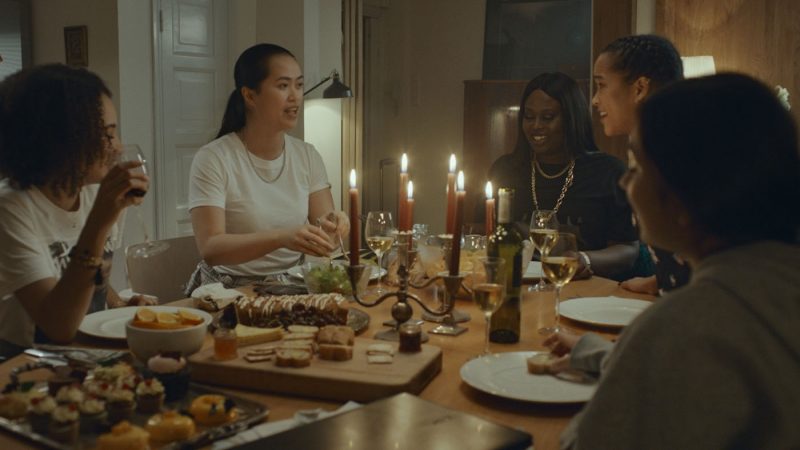”Everyone is worth a role” – advancing diversity in casting

Jantsu Puumalainen, from Helsinki Casting, Mikko Mäkelä, director of A Moment in the Reeds, and Jani Toivola and Mete Sasioglu, director and producer of the series Ainoa huoneessa, talk about how you can foster diversity through casting in scripted drama productions.
Written by Riikka Pennanen
Translation by Marjo Pipinen
Image above: from the film A Moment in the Reeds
Jantsu Puumalainen
Head of Drama Casting, Helsinki Casting

Jantsu Puumalainen, photo: Ansku Sinisalo
Jantsu Puumalainen, who has worked for ten years in the field, has been responsible for the casting of Dual, a Hollywood feature shot in Finland in 2020, and Next of Kin, a drama series set in Helsinki of the near future, to be released by Elisa Viihde in early 2022.
“This is a profession with artistic responsibility where the focus of my work is precisely in finding new talents, old talents, finding people who fit the roles in the script perfectly. In this way, through my work, I can increase the need for diversity and higher quality.
Right now, we have a culture of casting directors in Finland, it wasn’t like that before. For example, in Sweden they’ve had casting directors already for decades. Here in Finland, it feels like casting agents work in the background and they are used on occasion. Often they are not used at all. The director or the producer will call the actors they know, which means that we have the problem of seeing the same old faces.
Helsinki Casting is often the company they reach out to when they need diversity, be it people from different backgrounds, gender diversity or inclusivity. For me and for Helsinki Casting, everyone is worth a role. Based on the script, I may boldly suggest – in case the role, story or other things don’t demand otherwise – if the couple could be a female couple, even if the script might have a heteronormative idea. I usually also suggest people who are not white or straight for some of the roles.
In Finnish productions, it is often still the case that there is diversity in the extras but not in leading roles. This takes us to a dilemma: in a production set in a hospital environment, are all the cleaners and nurses people of colour, while the doctors are white and men?
We need brave producers, directors and screenwriters for us to see diversity in leading roles as well as minor roles. Still, it feels weird to use the word ‘brave’ because it shouldn’t require bravery to show the world as it is. Representation is just incredibly important. If it feels uncomfortable, then you need to go to that discomfort zone.
Casting for commercials, I’ve noticed that people ask for non-binary people. Commercials are a good example of how change happens because their pace is faster. With drama productions everything is slower.
I think one of the reasons why there is little representation of trans people is that screenwriters and producers lack knowledge. They are shy to talk about the issues and writing the characters, even though you could get help from Seta [LGBTI rights group], for example. Filmmaking scene still has strongly cisgender and heteronormative thinking and people. I hope that inclusion riders [demanding inclusivity from the film production] would take us further.
You still see cisgender people playing characters who are trans. I understand that we have few trans actors in Finland but we can do something about it, for example provide training and encourage people to pursue acting.
We have little training for acting on screen here in Finland, and we should have more. You can teach presence, articulation and delivery to people on all levels and from different backgrounds. We need people with disabilities, we need trans people, we need people with different backgrounds. It means we need to develop training that is more applicable.
I still read scripts where the men are heroes and psychopaths, and the women are secretaries and mothers. When I read these scripts, it makes me feel bad. If you ask actresses what kinds of roles they’d like to play, everyone will say: someone strong, crazy, a leader type. There are still very few roles like that.
It’s a shame we only see women in sizes XS-M in Finnish films and series. I can’t comprehend the idea behind it. If someone is a larger size, they make a point of it, for example showing that the character is not attractive or equal to others.
For example, in Spanish series and films you can see a spectrum of different people. I’d like to widen the imagery in Finland, too. This is my hope and dream.”
Mikko Mäkelä
Director, writer and producer of the film A Moment in the Reeds
A Moment in the Reeds (2017) was one the first Finnish queer films. The story focuses on Leevi (Janne Puustinen) and Tareq (Boodi Kabbani), a Syrian asylum seeker, who meet and fall in love.
London-based Mikko Mäkelä says that the making and casting of the indie film started without any networks in Finland. Mäkelä posted an open casting call on Facebook groups for casting, and got a lot of attention. They made clear on the casting call that the storyline would focus on a romantic relationship between two men.
”I was hoping that both leads would be queer actors, but with the role of Tareq, I imagined that in Finland it might be more challenging to find an actor with an immigrant background who also happened to be queer. I had to consider which aspect of the character’s identity was most crucial for the story and whether I would need to compromise. In the end, I didn’t have to.

A Moment in the Reeds
I wanted to keep the script and casting quite open because the film blurred the line between the characters and the actors. First and foremost, I strove for a sense of reality in the story, seeking authenticity of experience from both actors. That’s why we wrote the backstory together with the actors.
I wanted to explore the experiences of a non-white immigrant in Finland. I had a shy hope that an asylum seeker from Syria or Iraq, for example, might apply for the part, but was hesitant to count on this. Luckily, Jarno Pimperi, one of the producers of the film, knew Boodi Kabbani. This fortunate coincidence made the story possible as it is.
10–15 years ago, queer representation in film was so rare that you were grateful for anything. Back then, it didn’t matter so much if the actors were queer themselves. I was so hungry to see something in which I might recognise myself.
Both as an audience member and a filmmaker, and through my own life experience, I’ve come to understand that queerness is, in part, such an embodied experience, built up over many years, that it may be difficult for an actor who is not queer to understand it. It depends on the project, of course, whether the character’s sexuality or gender identity, for example, is central to the story or merely incidental.
In a film like A Moment in the Reeds, where sexuality is such an important part of the story, the actor’s own identity makes a difference.
If we think about representation or job opportunities, historically queer actors have had to stay in the closet, they’ve lost job opportunities when their sexual orientation has been revealed, and they may have been disqualified for straight roles. Until we reach complete equality, I think it is important that we prioritise queer actors for queer parts.
On the other hand, there may well be queer actors who’d like to play queer roles but won’t because they fear being outed. It says a lot about how deeply rooted homophobia still is in this industry, unfortunately.
I think it is crucial that underrepresented characters and characters belonging to minorities are written from within, not just from the outside. It’s the number one place to begin advancing diversity.
In the process of screenwriting, you should always consider with each character, whether they really have to be a white straight cisgender person and if it matters for the story – maybe they could be something else. This can be written into the script to avoid assumptions.
During casting, it is important to keep the process as open as possible and to avoid making assumptions.. In Finland, the acting scene has traditionally been very narrow. You absolutely have to look for actors also from outside of the Theatre Academy and other bigger schools.”
Jani Toivola, director, and Mete Sasioglu, producer
Ainoa huoneessa
”Production company Sons of Lumière is looking for 18–30-year-old women and non-binary people of colour for a TV pilot.”
This is what the production company Sons of Lumière posted on social media in August 2019 in their casting call for the pilot for the series Ainoa huoneessa (“the only one in the room”).
Ainoa huoneessa is a drama series about young people of colour and finding your own voice. The pilot was released in May 2020 and the series is currently in development. The actors were sought out especially through social media.

Ainoa huoneessa, image: Anton Thompson Coon / Sons of Lumière
Mete Sasioglu: ”We got positive feedback for spelling out ‘POC’ in the casting call. It can be as simple as that, saying directly who you are looking for.”
Jani Toivola: ”We acknowledged that we would most probably have to look for people outside of the professional field. It was important to think about the casting calls, how to explain things so that it would sound approachable and that people would understand that this might be aimed at them.
As we started meeting people, we realized that many who came into the room were there for the first time, and that they might even have a hard time understanding that they have the right to be in there and may even have something to bring to the room.
Because not all of them were professional actors, I tried to spend time on creating a space where the person would bring out the most interesting and important part of themself. It takes human skills.
This linked especially with the group stage of the casting. It felt significant that a larger group of POC were in the same room, all with an interest in acting, storytelling and performing. For many these days were important as such – it was important to get the experience that you are many in the room and you all want to act.”
Sasioglu: ”We are doing many things for the first time in Finland, so the process will perhaps take longer compared to knowing all the actors and writers of the series from the start.”
Toivola: ”It’s been clear at every stage that when we create something new, it inevitably takes more time than the old familiar process where certain blocks are already in place and there’s some certainty. You have to accept this if you want change. Then it’s also a question of financing. It’s good to be aware of it.”
Sasioglu: ”You have to be ready to listen, ask, learn and admit that you might not know everything.”
Toivola: ”As you start developing something new, you should think about the people in the very first room. Diversity will not advance if the people developing the ideas are the same as before. In a way, you should walk through the production and be careful that there aren’t things that shut out or create impossible obstacles.”
Sasioglu: ”I think we should discuss how diversity is monitored in Finland. Are there plans or tools for this? Should there be?
It would be good to have extra resources because looking for people takes time and resources. It would be a way to encourage and support diversity.”
Toivola: ”We are also creating a wider basis so extra support at this stage would be justified in terms of the culture at large in the future. We are just creating the basis, so the extra work is not just for this one project.”
Sasioglu: ”If we don’t work for diversity, there’s a great danger that we lose not only stories that deserve to be told but also audiences. A lot of people don’t find their stories in Finnish drama, they’d rather watch American series and films.”
Toivola: ”It is important to have courage to question old rules about what is authorship or how you develop professional skills. Do you need to come from a certain school or from a certain background, or could there be another kind of background if that means introducing new filmmakers and stories. Also, is our current storytelling tradition based on a certain kind of identity?
There are no ready answers but for us it’s been important to think about these questions.”
